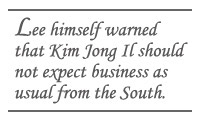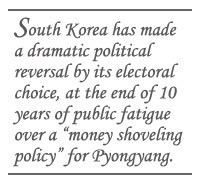A New Day for a Divided Peninsula
A New Day for a Divided Peninsula

SEOUL: With opposition conservatives coming to power, Seoul’s decade-long drive for reconciliation with North Korea – using cash infusions and other aid, often with no strings attached – comes to an end. President-elect Lee Myung Bak, 66, who built his reputation as a “can-do” mayor of Seoul and a hardnosed chief executive officer at Hyundai Engineering & Construction Co., vows to overhaul the North Korean policy of the outgoing Roh Moo Hyun administration. To receive cash aid and food supplies, vital for keeping the North’s economy from descending into chaos, the regime of Kim Jong Il must provide reciprocal steps of reform and relaxation, according to Lee’s policy advisors.
It’s a goal-oriented “realist” vision, and the new conditionality forms a key plank in Lee’s foreign-policy outlook, stressing security priorities and wider economic ventures overseas.

In his December landslide victory, Lee won by an unprecedented vote margin, more than his two rivals combined, a victory largely resting on his firm stance regarding the Kim Jong Il regime. Over the past 12 years, South Korea shoveled more than US $10 billion in aid to North Korea in the hope of winning peace from Pyongyang. But that did not stop the North from developing and testing nuclear weapons. To induce Kim to give up the nuclear option, in favor of opening and reform, Lee seeks to mix incentives with disadvantages.
He also mends diplomatic fences with Washington and Tokyo, frayed by Seoul’s frequent policy differences over North Korea’s nuclear issue. Under his administration, Seoul hopes to close ranks with Japan and the US to resuscitate the former trilateral economic-political partnership. This will be evident at both the six-party denuclearization process in Beijing and elsewhere, as Japan seeks resolution of its citizens kidnapped by North Korean agents.
Economic ties with Russia and China will also receive attention: Lee calls for “upgrading” relations with China to cover exchanges beyond trade. On Russia, he proposes participating in President Vladimir Putin’s ambitious plan for developing the eastern Siberian region, with technology and capital from South Korea and a workforce from North Korea.

Lee brings considerable economic and diplomatic experiences to such projects. In the early 1990s, as the Soviet system unraveled and China’s economic boom began, Lee was a globe-trotting Hyundai executive who used extensive business contacts to assist diplomatic ties with Seoul, always mixing business with politics. As project manager at many Hyundai construction sites in Southeast Asia and the Middle East – Malaysia’s Penang Bridge was completed under his supervision while he negotiated construction of the Jubail port in Saudi Arabia – Lee developed friendships with power-brokers, thus becoming Korea’s first president in office with firsthand knowledge of politics and economics in these key regions.
Lee’s rethinking of the policy line on the North comes as Kim Jong Il balks at coming clean on his clandestine nuclear-weapons program - including questions on the size of the plutonium stockpile and how far he’s gone on the uranium-enrichment process – and once again threatens to derail the six-party process. Under the February 2007 accord, the North promised to abandon its entire nuclear program in exchange for a million tons equivalent of fuel and other aid. The Kim regime has already received 100,000 tons of oil under this accord. Failure to consummate this deal is certain to trigger fresh tensions on the Korean peninsula, as both Lee and US President George Bush operate under strong political pressure to deliver.
With political stakes so glaring and US officials reportedly finding evidence of North Korean scientists trying to enrich uranium, Lee’s foreign policy team – headed by Korea University political science professor Hyun In Taek – has prepared an elaborate package of incentives for Pyongyang. That package includes a promise to train 300,000-strong human-resource base capable of implementing economic reform, including building a new financial system, an education program for economic managers and a welfare policy, all designed to allow the Kim regime to undertake restructuring with minimal intervention from the South.
If the North implements the denuclearization accord, it can then expect Seoul to help formulate a policy support for achieving a per-capita income of US$3,000 in 10 years time, Hyun said. Leaving the door open for the North to pick its way into rapprochement reflects Seoul’s anxiety to avoid being perceived as uncompromising.

But the price for spurning this survival package will be tough, equivalent to Kim committing economic suicide, Hyun has indicated. Kim’s sticking to the nuclear option would result in halting many aid projects vital for the North’s regime survival: millions of dollars in tourism revenues, tens of millions of dollars in wages paid to North Korean workers at Kaesong Industrial Complex, a complete stop in the two-way merchandise trade.
Lee himself warned that Kim Jong Il should not expect business as usual from the South. “I will not hesitate speaking out on the North’s human-rights record if necessary,” Lee thundered, indicating Seoul will no longer abstain from voting on the UN general assembly resolution condemning the North’s human rights. “It will be our own demand for word-for-word, action-for-action sequence,” said one policymaker, referring to the North’s own intransigent negotiating tactic.
Lee has never been shy explaining his policy initiatives. In phone conversations with Japan’s Prime Minister Yasuo Fukuda, he not only agreed they should put the two countries’ historical quarrels behind, but Lee also congratulated Japan’s “highly commendable” role in the six-party process. He suggested they conduct “shuttle diplomacy” for better policy coordination in the future, thus markedly departing from Roh’s statement a year ago underlining Seoul’s “diplomatic war” with Tokyo over territorial disputes.
At the same time, Lee gives top priority to restoring the strength of a Korea-US alliance. If Roh once shocked conservative Koreans by declaring an end to what he described as an informal trilateral alliance involving South Korea with the US and Japan, Lee in effect proclaims a rehabilitation of that political partnership.
As South Korea shifts to the right, parliamentary passage of the Korea-US free trade agreement is expected to get a strong boost in the next National Assembly, where Lee’s conservatives are expected to make a strong comeback with April elections.
Lee’s election could not have come at a better time for Washington and Tokyo, both preoccupied with forging a joint stance on the North’s nuclear challenge. South Korea has made a dramatic political reversal by its own electoral choice, at the end of 10 years of public fatigue over a “money shoveling policy” for Pyongyang. How the North will react to this change is a mystery. In a striking departure from its past practice, Pyongyang has yet to make public comment on the election results, taking an uncharacteristically long time analyzing the new development.

With the Lee administration committed to changing course, Kim Jong Il has reached a dangerous crossroads; he must decide between the nuclear path of more hardships, or take the gamble and open his garrison state for Seoul-aided survival. Despite the hype associated with the policy turnaround, Lee confidently cites his background in business to maintain a give-and-take profile. “We’re going to get out of our present uncomfortable relations with the US and being victim of Japan’s rule,” is how former foreign minister Yu Chong Ha, foreign policy advisor to Lee, has put it.
That’s hardly a headache for Washington and Tokyo. The challenge before President-elect Lee is to achieve this without pushing Kim Jong Il into a corner.
Shim Jae Hoon is a Seoul-based journalist and columnist.